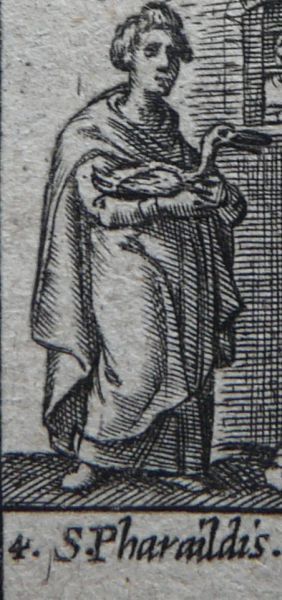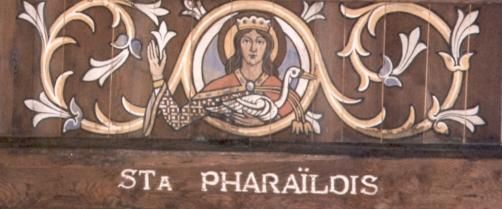Today, January 4, we celebrate the feast day of Saint
Faraildis of Ghent (650 – 740, also known as Saint Pharaildis), patron saint of
sick children, cattle, small animals, widows, victims of abuse, and strangely,
butter. Saint Faraildis lived a life
of quiet devotion to the Lord, despite pressures and physical abuse at the
hands of her husband. Saint Faraildis
demonstrates perseverance and steadfast hope and faith in the Lord, even in the
midst of difficult times. Perhaps there
is a lesson there for all of us!
Saint Faraildis’ lineage is somewhat unclear, with
historians best estimates that she was daughter to Theodoric, Duke of Lorraine
and Saint Amelberga of Maubeuge, and half-sister to Saints Gudula, Reinhildis,
Ermentrudis, and Emebertus As per the
custom of her times, she was married off by her father to a husband, Guido,
when she reached the age of maturity.
However, unbeknownst to her father and her new husband, Faraildis had
consecrated herself a virgin to the Lord, pledging eternal devotion and earthly
chastity. Rather than spend her nights
with her husband, Faraildis frequently visited the nearby church, spending her
evenings in prayer. Guido, wishing for
children, became increasingly jealous of her devotion to the Lord, and angry by
her refusal to subjugate herself to him.
He eventually became violent, inflicting physical abuse and torment upon
her. She withstood all insult with
pious dignity, nursing her husband without ill will following an accident that
broke his legs. During this time, she
ministered to him, and spoke to him of the Lord and salvation, but this only
served to infuriate him more.
It is unclear when or how Guido died, but he left Faraildis
a widow. From the time of his death,
she devoted herself entirely to a humble and simple life, offering daily
penance, and spending long hours in prayer.
She further became recognized as a holy woman in her town, and was
sought out for advice, counsel, and reportedly, miracles. She is said to have led the life of a
saintly nun, rising before sunrise each morning and journeying to a nearby
monastery for matins.
Saint Faraildis is frequently pictured with loaves of bread,
given one of the miracles reported at her intercession. It is told that a poor woman was once
begging for bread for her hungry children at a rich home. However, the woman of the home refused to
provide, exclaiming, “May Saint Faraildis change the loaves into stone if I
have any here!” Per legend, all of the
woman’s bread turned to stone, with two still preserved in Ghent as holy
relics. Similarly, Saint Faraildis is
oftentimes pictured with a goose, whom she is said to have restored to life
after it was stolen, killed, cooked, and eaten. Per holy legend, she gathered the remnants of the bird, and it
was reanimated and flew.
Saint Faraildis died at the age of ninety, around the time
of the Norman invasion. Her relics were
carried with the monks of the local church, where they were interred at
Ghent. She remains the patron of the
city to this day, where a city-wide celebration continues to be held in her
honor each feast day.
Daughter of Saint Amalberga and devout niece
of Saint Gertrude, and sister of Saint Gudula,
Despite your desire to consecrate yourself to God
Your parents made you enter into marriage.
On becoming a widow, you lived in prayer.
St Faraildis, pray to Christ for our souls!
Holy Faraildis, pray to God for us.





No comments:
Post a Comment
Thanks for leaving a comment. If you wish to submit a prayer request, however, please do so above, using the "Contact" tab.